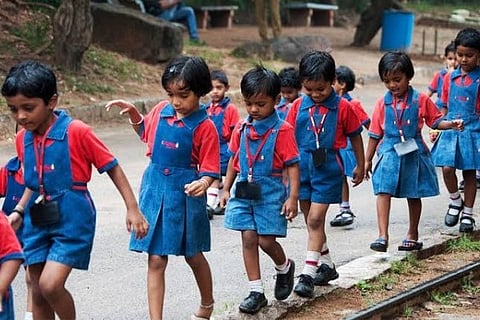
The Karnataka government has embarked on a significant initiative to rehabilitate children belonging to marginalized groups, including Safai Karamcharis, Ex-Manual Scavengers, Pourakarmikas, Graveyard caretakers, and Devadasi children. These children will now have the opportunity for walk-in admissions to residential schools operated by the Social Welfare Department. Notably, entrance examinations will not be required for admission to these institutions.
The government order, authorized by Ramesh Desai, the Social Welfare Minister of the Government of Karnataka, states, "Under the order of the Government, the residential schools operating under the association of Karnataka Residential Education Institutions have approved the admission of children from the Devadasi community, Safai Karamcharis, Manual Scavengers, Sanitation workers, and graveyard workers for the 6th class in the residential schools for the year 2023-24." This order ensures the enrollment of children from these occupational backgrounds into the Karnataka Residential Educational Institutions, administered by the government of Karnataka. The residential schools include:
Kittur Rani Chennamma Residential Schools (KRCRS): These schools focus on providing education to girl students from 6th to 10th grade in English medium under the CBSE Board.
Atal Bihari Vajpayee Residential Schools: These schools offer co-education from 6th to 12th grade.
The order emphasizes that there are reserved seats in the residential schools operated by the Karnataka Residential Educational Institutions for children from these communities, specifically for civil workers, cleaning workers, manual workers, and cemetery workers. The lack of information among these communities has been identified as a primary barrier, and the government has decided to promote awareness through social media. Additionally, the Ekalavya Model Residential Schools, run by the Ministry of Tribal Affairs, will also participate in this initiative. It is worth noting that the majority of individuals in these occupational groups belong to former untouchable castes and often face discrimination, particularly in the field of education.
Manual scavenging, the practice of manually handling and disposing of human waste, remains a dehumanizing and hazardous occupation that disproportionately affects marginalized communities, especially Dalits, in India. In Karnataka, as in other states, manual scavenging persists despite being officially banned since 1993. The state government has taken measures to eradicate manual scavenging and improve the living conditions of those affected. Here are key aspects related to manual scavenging in Karnataka:
Legal Framework: The Prohibition of Employment as Manual Scavengers and their Rehabilitation Act, 2013, also known as the Manual Scavengers Act, is the central legislation that prohibits manual scavenging and provides for the rehabilitation of manual scavengers. Karnataka has adopted and implemented this law. In March 2014, the Indian Supreme Court declared that state intervention is required to end manual scavenging and "rehabilitate" all individuals involved in this abominable practice, addressing not only the practice itself but also the abuses faced by the communities engaged in manual scavenging.
Rehabilitation Initiatives: The state government has introduced various programs and schemes to rehabilitate manual scavengers and their dependents. These initiatives encompass financial assistance, skill development training, and alternative livelihood opportunities.
Awareness and Sensitization: Efforts have been made to raise awareness among affected communities and the general public about the illegality and hazards of manual scavenging. Sensitization programs have been conducted to eliminate social stigma and discrimination associated with this practice.
Monitoring and Enforcement: The Karnataka State Safai Karmachari Commission (KSSKC) is responsible for monitoring the implementation of laws and policies related to manual scavenging. It works to ensure effective enforcement of the ban and the rehabilitation of manual scavengers.
Despite these efforts, completely eradicating manual scavenging remains a challenge. Factors such as social attitudes, lack of awareness, and inadequate enforcement contribute to the persistence of this practice. A continued commitment, increased resources, and a comprehensive approach are crucial to eliminating manual scavenging in Karnataka and across India.
Speaking to The Mooknayak Bezwada Wilson, co- founder and national convener of National Safai Karamchari Andolan Said “The residential schools (for the children of these groups) are always good because the children will not stay in home to help their parents, and in the future they will not do the same work. But still, we will have to seewhat the facilities are and what the cost and investment are, and only then can wen take a final call on this.”
Sanitation workers, or Safai Karamcharis, endure immense hardships and constant health hazards. Tragically, many lose their lives while cleaning sewage. Their children face educational challenges due to poverty and the stigma associated with their parents' work. Similarly, Devadasis, a highly stigmatized group, confront significant hurdles in their rehabilitation. The societal unacceptability they face leaves their children without a future. In this context, residential schools provide a lifeline for the children of Devadasis, who continue to face the remnants of this exploitative system in some parts of the country.
Also read:
You can also join our WhatsApp group to get premium and selected news of The Mooknayak on WhatsApp. Click here to join the WhatsApp group.